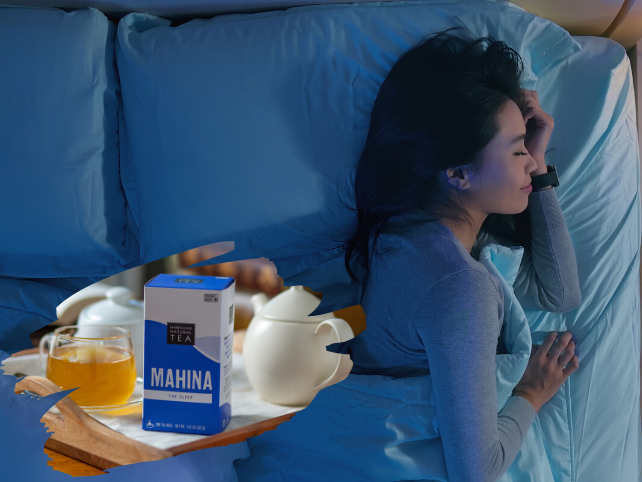Tea for Sleep
If you toss and turn at night or wake up still feeling unrested, you are certainly not alone. Although sleep is essential for good health, inadequate quantity or quality of sleep affects one in three American adults according to the Sleep Foundation. Short-term symptoms include next day grogginess, fatigue, reduced attention span and unpleasant mood changes. Chronic sleep deprivation can even result in longer-term consequences such as poor cardiovascular health or increased risk of diabetes and obesity. Sleep deprivation accounts for an annual loss of $400B in productivity and countless billions of dollars in healthcare costs each year.
Sleep is one of the 5 Pillars of Wellness for good reason. It is the body’s time to rest and recover from the day and prepare for the one to come. Sleep provides a multitude of other benefits in addition to a bodily recharge. For example, a good night’s rest boosts the immune system and improves performance. Sleep helps with concentration and cognitive functions. It even improves mood by boosting energy levels and happiness. The benefits of proper sleep are well documented yet many of us still do not get the prescribed rest we need.
The reality is that we live in a busy world that grows increasingly hectic. On occasions when we can get to bed early, it can still be hard to relax and “turn off” our brains. We may fall asleep then wake up in the middle of the night unable to go back to bed. What can we do?

A Night Routine to Improve Sleep Hygiene
Healthy sleep habits start during the day. Exercise, avoiding excessive alcohol or cutting off caffeine after a certain time can help us fall asleep quicker and improve sleep cycles at night.
A night routine which starts before bedtime can better prepare us to sleep well. The routine helps eliminate activities or things in our environment that may reduce sleep quality. The Sleep Foundation recommends quiet reading and stretching before bed as well as putting devices away at least an hour before bedtime since blue light interferes with the body’s natural circadian rhythm.
Prescriptions and over-the-counter sleep aids can help to fall asleep but researchers often discourage long-term use of these medications. A more natural alternative is to include tea in our bedtime routine. A soothing cup of tea is a great delivery mechanism for plant-based nutrients that can gently and safely help us unwind and get better sleep. Tea at night helps with hydration. A study in the American Journal of Medical Epidemiology showed that staying hydrated overnight can reduce the risk of a heart attack or stroke.
Start with low to non-caffeinated teas like white, green, or herbal teas. Some popular herbal ingredients that help with sleep are lavender and mint, but the king of herbal teas is chamomile. Known for its sedative effects, chamomile contains an antioxidant called apigenin which can encourage muscle relaxation and sleep. Chamomile is available as a straight loose tea and is also used as an ingredient in Chocolate Mint Tea. Tea bag selections with chamomile include Lemon Chamomile and NANEA.
Introducing MAHINA | Tea For Sleep
Chamomile is also an ingredient in our newest blend, MAHINA | For Sleep. Mahina is the Hawaiian word for moon so a cup or two of MAHINA at night is appropriate. MAHINA is crafted to promote restful sleep by helping the body’s natural production of gamma-aminobutyric acid, or GABA. GABA is one of the main chemical messengers in the brain involved in regulating sleep. GABA reduces brain activity, making it easier to relax and fall asleep. Two ingredients in MAHINA that boost GABA production are valerian root and passionflower.
According to the article, How Valerian Root Helps You Relax and Sleep Better, studies suggest that valerian root can help us fall asleep faster, improve quality of sleep, reduce the number of awakenings and to sleep longer. Valerian root’s uses date as far back as the ancient Greek and Roman civilizations. It is sometimes referred to as “nature’s valium.”
The other active ingredient to boost GABA is passionflower. Studies show that passionflower calms brain activity, helps with falling asleep more quickly and improves overall quality of sleep.
Chronic poor sleep can throw hormones out of whack. Adaptogens can help to rebalance hormone levels. Two adaptogens in MAHINA include moringa and mamaki that are both grown in Hawaii.
Moringa is a superfood packed with antioxidants and vitamins. It boasts vitamins A and C, potassium, calcium, iron, and protein. Our moringa is extra special because it grows chemical-free in microbial-rich soil. Mamaki helps to relieve fatigue, stress, and anxiety. Drinking MAHINA at night is a delicious, convenient way to incorporate these two superfoods into our diet.
A good night’s sleep is something we all appreciate. A night routine with tea is a safe, gentle, and easy solution. MAHINA | For Sleep is a tea that can help with more restful slumber.
Written by Kahiau Among
Resource links:
- https://www.sleepfoundation.org/sleep-deprivation
- https://www.sclhealth.org/blog/2018/09/the-benefits-of-getting-a-full-night-sleep/
- https://www.healthline.com/nutrition/teas-that-help-you-sleep#3.-Chamomile-tea
- https://www.healthline.com/nutrition/valerian-root#what-is-valerian
- https://ods.od.nih.gov/factsheets/Valerian-HealthProfessional/
- https://www.medicalnewstoday.com/articles/323795#what-is-passionflower
- https://www.healthline.com/health/sleep/how-sleep-can-affect-your-hormone-levels#hormones-and-sleep
- https://www.eatthis.com/moringa/


Share:
Tea and Exercise: More Fitness With These Workout Teas
Cold Brew Green Tea
5 comments
Very interesting article. I truly learned a lot. Thank you for sharing.
Thanks 😊
Love to drink tea before bed, decaffeinated of course.
I really need this because I have chronic insomnia and stress and anxiety and PTSD I just want to sleep and trun my head off because when my brain doesn’t stop all I do is put myself through unneeded tears and soreness
Mahina is one of the best night time sleep teas I have ever enjoyed. The aroma is relaxing, the flavor is delicious and my sleep is way better than ever when I drink it. Thanks for helping me live a better life…